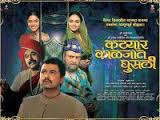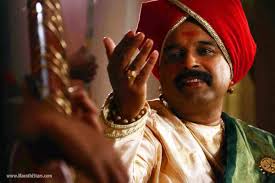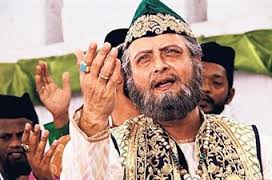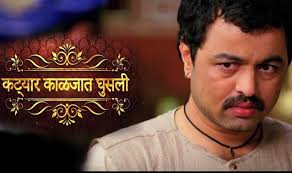Contribute
| Marthi Film Review: Katyar Kalijat Ghusli |
Shuchita Rao
12/10/2015
The Marathi movie with English subtitles “Katyar Kailjat Ghusli†(Dagger pierced the heart) revolving around the theme of Hindustani Classical Music and gharanas (schools of music) was received with great enthusiasm and delight by Boston’s audience on the weekend of December 5-6. Four sold-out shows on December 5 & 6 were arranged to be shown at Apple Cinemas in Cambridge, MA. Two shows on December 5th were presented by 'Marathi Cinema Boston' and two shows on December 6th were presented by 'Marathi Cinema Boston' in collaboration with 'Shadaj'. The movie Katyar Kalijat Ghusli tells the story of a young man, Sadashiv, whose ardent devotion and love for Hindustani classical music leads him on a journey to Vishrampur in search of his long lost Guru, Pandit Bhanu Shankar Shastri. Alas, he has arrived too late to resume instruction from his teacher because Panditji has permanently lost his voice due to food poisoning by a rival musician’s wife. Panditji, a man of great kindness and compassion, however suggests that Sadashiv continues his musical training under his rival, Khan Saheb, a Muslim Ustad of great musical standing who holds the current title of the presiding court musician in the kingdom of the Vishrampur. Khan Saheb and Panditji had started out as friends and mutual admirers but became enemies after ill feelings developed between them as a result of an annual music competition hosted by the Maharajah announced Panditji as the competition’s winner. At the subsequent year’s competition, the Ustad emerged as the contest’s winner, ousted the Pandit from residing in a stately mansion and forced him to surrender the court musician’s title. The winner, Khan Saheb also became owner of a magnificient dagger (katyar) with the right to commit a single murder that the royal state would pardon if the act were to be in self-defense. The young disciple Sadashiv is eager to further his musical training but much to the disappointment of his Guru, Ustadji denies music lessons to Sadashiv. Sadashiv secretly imbibes Ustadji’s music by serving at Ustadji’s household in the capacity of a servant. At the next annual royal competition, disciple Sadashiv challenges Ustadji. At one climactic point during the competition, Ustadji requests the Maharajah the permission to murder Sadashiv by alleging theft of his gharana’s signature musical style by Sadashiv. The members of the court are shocked by the request and the Maharajah, being a fair king, is torn between allowing Ustadji his legitimate right to kill and saving an exceptionally talented musician’s life. In a dramatic turn of events, Ustadji miraculously withdraws his request to murder the young man after hearing him sing music that captures his heart with its beauty. Between competitions, rising egos, victory and defeat, two master musicians and the members of the royal court become witness to the reality - the legacy of the music of the rival gharanas finally rest on the strong shoulders of their young disciple Sadashiv who has effectively absorbed elements from both gharanas into his musical style. The story ends with a reconciliation between Ustadji and Panditji. The feature film is an adaptation from the Marathi musical stage drama “Katyar Kalijat Ghusli†written by Purushottam Darvhekar. The drama was first performed in 1967 and by the year 1981, the drama completed 527 shows during which the renowned classical singer Vasantrao Deshpande played the role of ‘Khan Saheb’. His role in this drama became so popular that he earned the nick-name Vasant‘khan’ Deshpande. The original play has been turned into a musically sound , visually arresting, transporting film with Shankar Mahadevan as Pandit Bhanushankar Shastri, Sachin Pilgaonkar as Khan Saheb and the director Subodh Bhave playing the role of the disciple Sadashiv. The movie is Subodh Bhave’s first directorial venture and features singer Shankar Mahadevan’s debut performance as an actor. Katyar Kalijat Ghusli’s music arranged by the trio Shankar-Ehsaan-Loy deserves special mention. There is a wide variety in the genres presented - Khyaal, Natya Sangeet, Bhajan/Kirtan, Taraana and Qawwali. Even the simplest act of recitation of poems is done effectively. Indian music’s oldest musical genres Dhrupad and Dhamar were unfortunately not included perhaps because the khyaal had gained popularity in the era being depicted in the movie. Lilting compositions in haunting ragas such as Salagwarali Todi (Ghei Chand Makarand) Kirwani (Dil ki Tapish), Desh (Man Mandira), Kedar (Shahe-Tarannum), Lalit (Tejonidhi), Yaman Kalyan tarana, Sohoni (Surat Piya ki) and Puriya Dhanashri (Sur se saji sangini) sung by top-notch vocalists of our current generation such as late Pandit Vasantrao Deshpande’s grandson - Rahul Deshpande, late Pandit Jitendra Abhisheki’s disciple - Mahesh Kale, popular playback singers Shankar Mahadevan, Arshad Muhammad, Divya Kumar, Sawani Shende and Arijit Singh. The renditions of khyaals and natyageet are marked by the nuanced, emotion-packed delivery of musical notes(sur) and impeccable delivery of difficult taan movements. Several of the compositions, some of them such as the Natyageet “Ghei Chandâ€, originally composed by the late Pandit Jitendra Abhisheki, have interesting architecture. The Kirwani Bandish "Dil ki Tapish" for instance sounds like it has the gait of ten cycle Jhaptaal but cleverly makes a landing on the first beat “sum†of 16 beat cycle Teentaal. Natyageet Ghei Chand is rendered at one time in ten beat jhaptaal cycle and at another time in 16 beat teentaal cycle. The treatment of the same composition in two taal cycles is an interesting example of the creativity and skill of the composer. There is impressive balancing of sur-bhaav, shabda-bhaav and laya-bhaav. The percussion is not just limited to tabla - there is Pakhawaj, Mridang, Dholak and Manjeera among other instruments and transitions from one variation of theka to another are not only managed seamlessly but with finesse. The instruments Saarangi, Sitar, Flute and Swarmandal add great aesthetic value to the overall song presentations. The chorus in the bhajan such as the opening “Ganpati Bappa Morya†is sung by trained, tuneful singers and the lyrics of the compositions have intense, soul-touching capability. The US 1.2 million budget movie is 2.5 hours long and engaging for the most part. Brilliant music, masterful direction, excellent acting, colorful costumes and powerful cinematography are its strengths. A bygone era which celebrated classical music is recreated effectively as in the preceding films of similar themes such as Satyajit Ray’s acclaimed film “The Music Roomâ€. Emotions of anger, envy, pride, jealousy, kindness, sympathy, sadness, curiosity, happiness and joy were portrayed well by the actors even though it is a bit of a surprise that the movie has succeeded despite not having the slightest trace of romance or humor. The director Subodh Bhave and his team deserve kudos for recreating the original drama Katyar Kalijat Ghusli through the medium of film. Given that cities in the US such as Boston and New Jersey and multiple Indian cities had packed cinema halls appreciating the film whole-heartedly, the movie seems poised to win national as well as international awards.
You may also access this article through our web-site http://www.lokvani.com/



